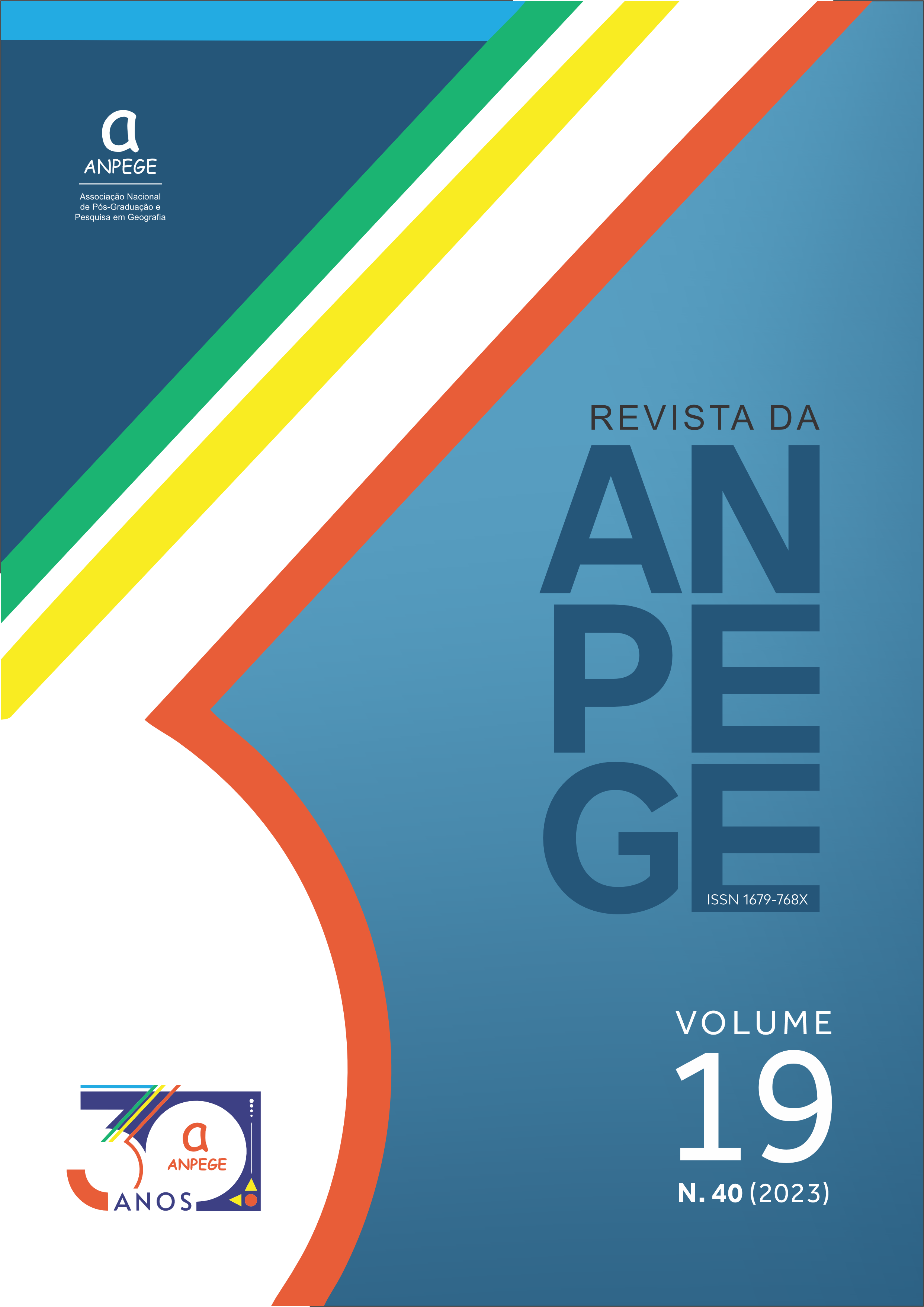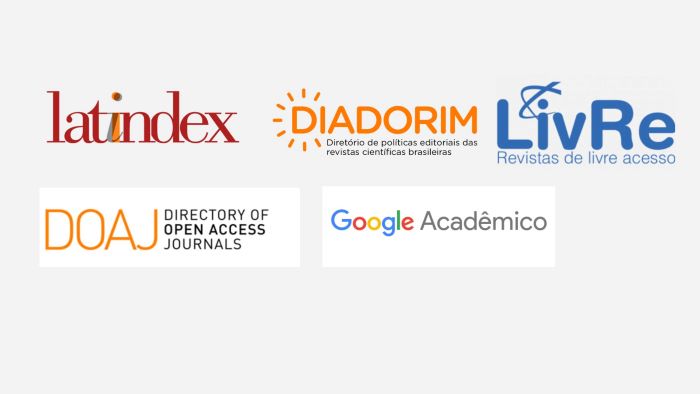PATHS THROUGH A COLONIZED CULTURE
ROADMAP OF EPISTEMIC URBANIZATION IN TOURISM IN MARICÁ-RJ
DOI:
https://doi.org/10.5418/ra2023.v19i40.17786Keywords:
Maricá-RJ, Rural Tourism, Folk Culture, Geopoetics, TerritorialitiesAbstract
This study reports on the initial reflections of doctoral research in Geography at Rio de Janeiro State University. The thesis, based on militant perspectives for epistemic rescues, is authored by an Afro-indigenous researcher who observes the rural municipality of Maricá-RJ. Maricá, a word of Tupi-Guarani origin, declared in 2017 Cidade da Capoeira (City of Capoeira) by the City Council as part of a series of actions in favor of Afro-Brazilian culture, has Afro-Indian structural origins. However, according to the official website, its history is essentially colonial. This work focuses on the city's official tourist route and its approach to local culture. It looks at the sites chosen as representative and therefore listed for visitation on the portal. It also identifies the historical and cultural markers of these spaces in terms of their origins and meanings. The city, despite its post-colonial history and the efforts of the Culture Department to maintain the relationship between inhabitants and the natural environment in harmony, based on an agro-ecological culture, for example, this year carried out the municipality's first Cultural Census; however, its official tourism itinerary makes no mention of the indigenous ethnic groups, African peoples and Afro-Brazilian personalities who lived here and played a leading role in the construction of many of the spaces chosen as tourist attractions and whose values guide the maintenance of the city's natural spaces and planting, harvesting and eating habits. It is essential that the Secretariats of Culture, Human Rights and Tourism work together to restructure the text that presents the city on the official website.
Downloads
References
ACOSTA, Alberto. O Bem Viver: uma oportunidade para imaginar outros mundos. São
Paulo: Autonomia Literária, Editora Elefante, 2016. 268p.
ADICHIE, Chimamanda Ngozi. The danger of a single story. TED: ideas worths spreading. 2009. Disponível em:<https://www.ted.com/talks/chimamanda_ngozi_adichie_the_danger_of_a_single_story>. Acesso em 23.nov.23
BARTHOLL, Timo. Territórios de resistência e movimentos sociais de base: uma
investigação militante em favelas cariocas / Timo Bartholl. – Niterói : [s.n.], 2015. 433 f.
CASIMIRO, Pammella. Escre(vi)vendo a Baixada: (des)estruturação do Racismo Ambiental no bairro de Campos Elíseos. Monografia (Graduação em Ciências Ambientais). Universidade Federal do Estado do Rio de Janeiro, 2021.
CHAVES, Kena Azevedo. Corpo-território, reprodução social e cosmopolítica: reflexões a partir das lutas das mulheres indígenas no Brasil. Scripta Nova. Revista Electrónica de Geografía y Ciencias Sociales, v. 25, n. 4, 2021. DOI: https://doi.org/10.1344/sn2021.25.32707
CRUZ, Leonardo Ramos. AS MONTANHAS FALARAM ALTO, EU, DA ESCOLA RESPONDI: Uma Escrevivência Geopoética para a Conservação da Natureza. 2021. 172f. Dissertação (Mestrado em Ecoturismo e Conservação) – Centro de Ciências Biológicas e da Saúde, Universidade Federal do Estado do Rio de Janeiro, Rio de Janeiro, 2021.
DA SILVA, Elsa Peralta. Património e identidade. Os desafios do turismo cultural. Antropológicas, n. 4, p. 217-224, 2000.
HAESBAERT (a), Rogério. Do corpo-território ao território-corpo (da terra): contribuições decoloniais. GEOgraphia, v. 22, n. 48, (70-95), 2020. DOI: https://doi.org/10.22409/GEOgraphia2020.v22i48.a43100
KOZEL, Salete. Geopoética das paisagens: olhar, sentir e ouvir a “natureza”. Caderno de Geografia, v. 22, n. 37, p. 65-78, 2012.
KRENAK, Ailton. Ideias para adiar o fim do mundo (Nova edição). Editora Companhia das Letras, 2019.
______________ Futuro ancestral. São Paulo: Companhia das Letras, 2022.
MARICÁ TURISMO. Roteiro Turístico Cultural. Conheça Maricá. Disponível em: <https://contato.site/5d9bab8/marica-cvb3/roteiroturisticocultural> Acesso em 25.nov.23.
MENDES, Wilson. Artista transforma escadaria em ponto turístico pintando nela a história de Maricá. EXTRA. 2017. Disponível em:<https://extra.globo.com/noticias/rio/artista-transforma-escadaria-em-ponto-turistico-pintando-nela-historia-de-marica-20801075.html> Acesso em 25.nov.23.
MONDARDO, Marcos Leandro. O Corpo enquanto “primeiro” território de dominação: O biopoder e a sociedade de controle. Biblioteca On-line de Ciências da Comunicação, 2009.
ONU BRASIL, Aldeia indígena em Maricá preserva o idioma guarani. ONU BRASIL. 2017. Disponível em: <https://www.youtube.com/watch?v=rmi-2cDe9MM&ab_channel=ONUBrasil>. Acesso em 26.nov.23.
PREFEITURA DE MARICÁ. Plano Municipal de Desenvolvimento Turístico Sustentável - Maricá 2030. Maricá: Relatório elaborado pela Secretaria de Turismo de Maricá com apoio do Federação de Convention & Visitors Bureaux do Estado do Rio de Janeiro, 2018. 136p.
REIS, Camila Tomaz. Encruzilhadas Geopoéticas na Conservação da Natureza: Territorialidades e Guardas-Parques em Território Cunhambebe. 2021. Dissertação de Mestrado Profissional em Ecoturismo e Conservação, Universidade Federal do Estado do Rio de Janeiro, Rio de Janeiro, RJ, 2021. 399f.
RICHARDS, G. (2009) Turismo cultural: Padrões e implicações. In de Camargo, P. and da Cruz, G. (eds) Turismo Cultural: Estratégias, sustentabilidade e tendências. UESC: Bahia, pp. 25-48.
RUFINO, Luiz. Pedagogia das encruzilhadas. Rio de Janeiro: Mórula Editorial, 2019. DOI: https://doi.org/10.24065/2237-9460.2019v9n4ID1012
SCARANO, F. R. Regenerantes de Gaia. Rio de Janeiro: Dantes, 2019.
SIMAS, Luiz Antonio. O Corpo Encantado das Ruas. 4a ed. Rio de Janeiro: Civilização
Brasileira, 2020.
RUA, João. Urbanidades no Rural: o devir de novas territorialidades. Revista Campo-Território, Uberlândia, v. 1, n.1, p. 82-106, 2006. DOI: https://doi.org/10.14393/RCT1111781
Downloads
Published
How to Cite
Issue
Section
License
Autores que publicam nesta revista concordam com os seguintes termos:Autores mantêm os direitos autorais e concedem à revista o direito de primeira publicação, com o trabalho simultaneamente licenciado sob a Creative Commons Atribuição-NãoComercial-CompartilhaIgual 3.0 Brasil que permitindo o compartilhamento do trabalho com reconhecimento da autoria do trabalho e publicação inicial nesta revista.
Autores têm autorização para assumir contratos adicionais separadamente, para distribuição não exclusiva da versão do trabalho publicada nesta revista (ex.: publicar em repositório institucional ou como capítulo de livro), com reconhecimento de autoria e publicação inicial nesta revista.
Autores têm permissão e são estimulados a publicar e distribuir seu trabalho online (ex.: em repositórios institucionais ou na sua página pessoal) a qualquer ponto antes ou durante o processo editorial, já que isso pode gerar alterações produtivas, bem como aumentar o impacto e a citação do trabalho publicado (Veja O Efeito do Acesso Livre em http://opcit.eprints.org/oacitation-biblio.html.)
Authors who publish with this journal agree to the following terms:
Authors retain copyrights and grant the Journal the right of first publication with the work simultaneously licensed under a Creative Commons Atribuição-NãoComercial-CompartilhaIgual 3.0 Brasil that allows others to share the work with an acknowledgement of the work's authorship and initial publication in this Journal.
Authors are permitted to enter into separate, additional contractual arrangements for the non-exclusive distribution of the Journal's published version of the work (e.g., post it to an institutional repository or in a book chapter), with an acknowledgement of authorship and initial publication in this journal.
Authors are permitted and encouraged to publish and share their work online (e.g., in institutional repositories or on their website) prior to and during the submission process, as it can lead to productive exchanges, as well as increase the impact and citation of published work (See The Effect of Open Access - http://opcit.eprints.org/oacitation-biblio.html.)




